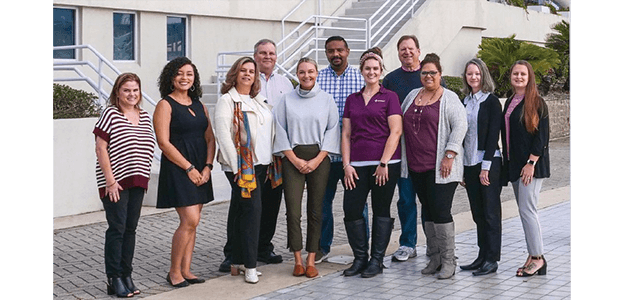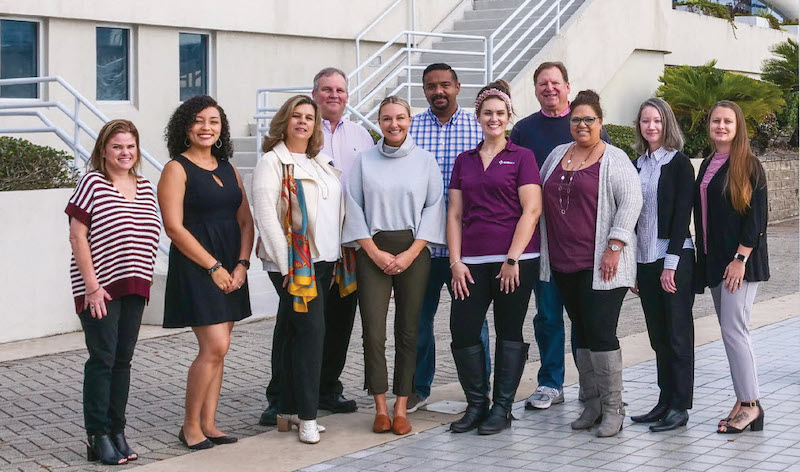
Driving operational excellence while supporting growth of a company’s services is a huge achievement, especially during a pandemic that just won’t quit. But The Haskell Company didn’t stop there. It pushed to expand its Diversity and Inclusion efforts and create a better workplace—all of which turned out to be the recipe for an exceptional year in 2021.
This company—which describes itself as a “one-stop-shop” for architecture, engineering, and construction services—prides itself both on delivering learning and development that enables continued growth and profitability and on giving employees the “BEST job of their lives.” Overarching these achievements is a commitment to working with leadership to ensure the company meets its strategic goals. Learning and development is clearly a foundational pillar at Haskell.
POSITIVE CLIENT EXPERIENCES
Learning efforts fall short if the end result isn’t a better experience for both internal and external clients. At Haskell, Training leads the way to ensuring a consistently strong client experience. “Haskell’s Client Experience Training Program is targeted at strengthening our team member internal and external client-facing interface, a key element in our Quality Production Rating (QPR), the project roadmap, with 50 percent of the weighted rating coming from our clients’ feedback and experience,” explains Director of Learning & Team Member Engagement Brookejones-Chinetti.
Adds Manager of Team Member Engagement Barbara Cotes, “This training has a dedicated focus on strengthening key communication skills necessary for project production output success, as well as growing our expanding business with our existing and new client base.”
Delivered by the Learning, Development, and Engagement team, this training provides a structured workflow balanced between in-person, virtual, and electronic (e-mail) delivery methods for each phase of projects—from design to mobilization and construction to delivery. Emphasis on active listening, key interface points in a project schedule, and agile technology delivery allows team members to practice new skills while receiving immediate feedback.
Haskell uses an internally developed dashboard called AuditBoard that includes technical aspects of the company’s construction processes. These encompass geo-technical, building envelope, and quality processes, plus feedback and training from its foundational course, The Client Experience. That is a 50 percent weighted score as part of the QIP (Quality Implementation Planning).
As a result, Haskell achieved a QIP score of 9.03 on a 10-point scale enterprise-wide, exceeding its goal of a 7.0 average by 22 percent. “Additionally, and tied to our strategic goal to ‘Drive Operational Excellence,’ we achieved/secured more than 80 percent repeat-existing customer business in 2021 and increased future contracted work of more than SI billion for 2021,”Jones-Chinetti and Cotes reveal.
PERSONALIZING LEARNING
As learning moved mostly online during the pandemic, opportunities opened for Haskell to optimize technology such as artificial intelligence to personalize programming for each employee.
Haskell invested in a platform that will allow for personalized learner “recommendations” a la Netflix movie suggestions. The company also incorporated learning playlists—which Jones- Chinetti describes as similar to Spotify playlists for working out—within its learning management system (LMS). This allows team members to create a playlist on a topic or competency of their interest. “They’re able to curate a unique and impactful learning experience with Haskell-specific content supplemented with external articles/videos/experiences they find useful,”Jones-Chinetti explains.
Haskell continued to hone its technical training through virtual reality (VR) with its Hazard Elimination Risk Oversight (HERO) program. This proprietary VR platform was designed to reinforce the safety training of field teams by identifying visible hazards in the virtual environment. “Like most training, simulations require innovation on two levels: development and delivery,” says Hamzah Shanbari, manager — Construction Technology & Innovation. “HERO continues to provide both, thanks to a university partnership including Georgia Institute of Technology and Kennesaw State University.”
The virtual environment was created from 3D pictures and drone videos—including 360-degree images all taken at Haskell jobsites—featuring known jobsite dangers the company tracks. An additional innovation: Haskell developed HERO to be utilized on a mobile phone. Instead of VR headsets (which can run several hundred dollars apiece), users insert their phone into a 3D cardboard cover.
“HERO was at the forefront of Haskell’s 2021 Annual Safety Week on all jobsites,” Shanbari says. “It contributed to our historically low Recordable Incident Rates of 0.36 (significantly below the industry average of 2.50), with two consecutive quarters of zero incidents—a first for Haskell!”
A “DAY OF UNDERSTANDING”
Communication and understanding in a corporate environment can be challenging. To ensure a diverse and inclusive workforce, Haskell organized a “Day of Understanding.”
“Our eight-member Executive Leadership Team —through direct communication, as well as involvement in the selection of the offerings—constantly expresses how important it is to Haskell that we broaden our views while looking for ways to influence positive change,” explains Executive Vice President and Chief Human Resources Officer David Thaeler. “During our Operations Meeting, held quarterly with all team members at the director level and above, our CEO promoted our Diversity offerings and our methodology of delivery, promoting a trickle-down effect to group and team meetings.”
During the Day of Understanding, members of Haskell’s Executive Leadership Team held group meetings with more than 250 team members to answer questions about Diversity, working across teams, mentoring opportunities, and improving communication, as well as to reinforce topics covered in the Haskell Together Diversity Suite.
Not surprisingly, given these efforts, Haskell offers comprehensive communication training. Featuring 27 hours of programming, the Haskell Communication Series is an interactive, virtually delivered course that uses lecture, an interrogatory approach, assessments, and group and individual exercises. This blended program consists of:
Communication Series I: Offered to all team members, this part focuses on understanding formal and informal communication models and processes.
Communication Series II: The second part is for team members who have moved into lead or supervisory positions, or who are being considered for leadership, focusing on more formal conversations, healthy conflict, and direct conversations.
Advanced Communication: For managers and above, this portion of the series is designed to take formal communication to a level that includes negotiation strategies and client interactions.
“The hands-on, cumulative nature helps team members understand effective communication through Emotional Intelligence and behavioral models, and the difference between healthy and unhealthy conflict and formal and informal communication—and how to choose the right approach for each situation,” says Director, Leadership Consultant Chip Scholz. “The series design enables learners to overcome internal and external factors that can improve how they present, negotiate, and communicate with customers and employees—all while supporting Haskell’s values.”
In 2021, Haskell enhanced its customer service via an increased focus on dynamic communication. Partly as a result of this training, says Jones-Chinetti, the company secured repeat business upwards of 80 percent and achieved record-breaking sales in excess of its $1.5 billion target.
FUTURE LEADER PIPELINE
Looking ahead, Haskell has outlined a Workforce Development (WFD) plan for 2032 that provides a map to power talent development. WFD will deliver on multiple fronts to support operations groups:
- Developing and updating long-term need projection models on a per-position basis
- Maximizing the company’s brand and reach for talent by expanding the University Relations program
- Refining and growing critical position-specific development, such as the current Program for Director Development
“WFD will continue together with Talent Acquisition to develop new talent pipelines, and will work with Learning, Development & Engagement to build on an already successful slate of knowledge and skill development for our team members,” says Director of Workforce Development Mike Huskey. “We will conduct ongoing evaluation of WFD initiatives to ensure they are meeting operations group needs and advancing the effectiveness and engagement of our team members.”
The 10-year view of the company is the same today as it was when described in 1990 by Preston Haskell in “The First 25 Years of Haskell,” Huskey says, paraphrasing: “Our belief is that the future leaders of our company are working here today. We must invest heavily in their development with bifocal glasses. That is, we must have a strong and steady hand on the wheel for the present, and to accomplish our vision, we must always have an eye on the horizon and invest in all our people accordingly.”


 HASKELL LEADERSHIP, DEVELOPMENT & ENGAGEMENT TEAM: Front row, from left: Christine Scholz, LD&E Coordinator; Maria Jose Toro, Development Specialist; Barbara Cotes, Engagement Manager; Brooke Jones-Chinetti, Director, Learning, Development & Engagement; Ashley Isaacson, Engagement Partner; Kim Pugh, Administrative Assistant II; Janet True, Director, Learning Standards & Practices; and Sarah Richards, Technical Training Coordinator. Back row, from left: Michael McLauchlan, Director, Field Technical Training; Lijo Abraham, LMS Administrator; and Chip Scholz, Director, Leadership Consultant.
HASKELL LEADERSHIP, DEVELOPMENT & ENGAGEMENT TEAM: Front row, from left: Christine Scholz, LD&E Coordinator; Maria Jose Toro, Development Specialist; Barbara Cotes, Engagement Manager; Brooke Jones-Chinetti, Director, Learning, Development & Engagement; Ashley Isaacson, Engagement Partner; Kim Pugh, Administrative Assistant II; Janet True, Director, Learning Standards & Practices; and Sarah Richards, Technical Training Coordinator. Back row, from left: Michael McLauchlan, Director, Field Technical Training; Lijo Abraham, LMS Administrator; and Chip Scholz, Director, Leadership Consultant.
